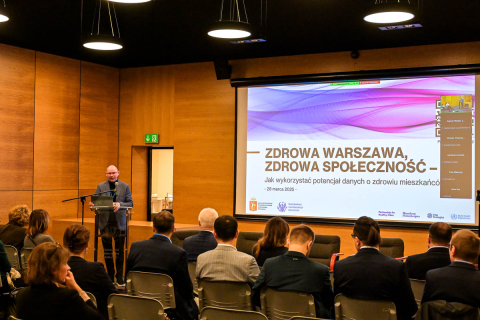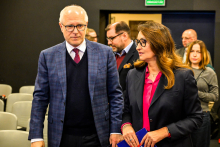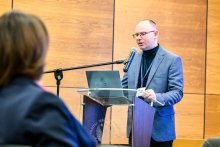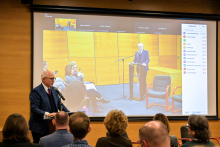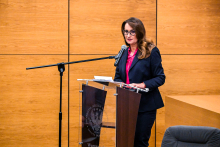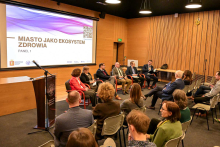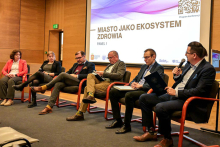On 28 March 2025, a conference titled “Healthy Warsaw, healthy community – how to utilize the potential of population health data” was held at MUW’s University Clinical Center. The event was organized jointly by the Medical University of Warsaw and the City of Warsaw, supported as part of Warsaw’s cooperation with the global Partnership for Healthy Cities network.
The event provided a practical dimension to the cooperation agreement signed in 2023.
- It is hard to imagine a better alliance than the one between the City of Warsaw and the Medical University of Warsaw to carry out such an ambitious task as the Healthy Warsaw - Healthy Community project - said Professor Rafał Krenke, Rector of MUW. – Exactly two years ago, our long-standing cooperation in deepening knowledge and exchanging experience was strengthened by the signing of an agreement to implement the aforementioned project. As part of the agreement, the first undertaking was the implementation of the consensus program and participation in the broader Partnership for Healthy Cities project, which involves many European cities - recalled the Rector.
As the organizers emphasized, Warsaw, as a dynamically developing metropolis, is today confronted with growing health challenges, which can be effectively addressed if actions are based on reliable data, analyses, and cross-sectoral cooperation.
- Health care is primarily the responsibility of the state, and Warsaw is in a special position because it can participate in the process of securing the health needs of our male and female residents. We have as many as 10 city hospitals and over 120 outpatient clinics, which we support financially in developing infrastructure. We also implement numerous prevention and health care programs - emphasized Renata Kaznowska, Deputy Mayor of the Capital City of Warsaw.
How to use population health data?
Three expert debates were held during the conference, which addressed topics such as the mental health of the population, as well as the impact of the environment and the quality of public spaces on the well-being of residents. Challenges facing the health system in the face of rising rates of diabetes, cancer, and cardiovascular disease were discussed; a separate panel was devoted to the possibility of building a coherent urban health data ecosystem. Conference participants unanimously stressed that creating a data-driven urban health policy not only supports more effective action but also enables real-time responses to local health needs.
Particular attention was paid to the presented model for assessing the health status of the population, based on the analysis of registry data from National Health Fund resources. The pilot report being developed by the interdisciplinary expert team also identified the biggest challenges, including a sharp rise in obesity and diabetes, and deteriorating mental health of adolescents and young adults.
The conference concluded by announcing the continuation of joint activities between the city and MUW in the next phases of the project.
The conference was attended, among others, by: Prof. Rafał Krenke, Rector of MUW, Renata Kaznowska, Deputy Mayor of the Capital City of Warsaw, Dr. Łukasz Czyżewski, Vice-Dean of the Faculty of Health Sciences, Olga Pilarska-Siennicka, Director of the Health Policy Office of the City of Warsaw, Olaf Osica, Director of the Strategy and Analysis Office of the City of Warsaw, Ewa Maleszyk, Deputy Director of the Health Policy Office, Milena Kozioł-Rostkowska, Deputy Director of the Analysis and Strategy Office at the Ministry of Health, Beata Koń, Deputy Director in the National Health Fund, Maria Penpeska, Head of the Department of Health Statistics and Health Care Centre, Statistical Office in Kraków, Marzena Smolińska, Director of Medicover for Public Policies, Maria Piętak-Frączek, President of the Association of Healthy Polish Cities.
